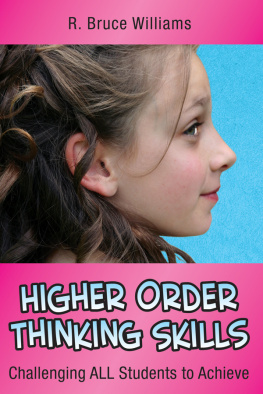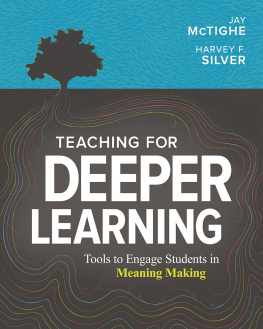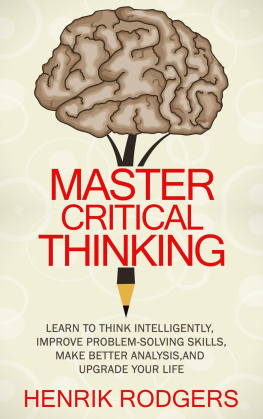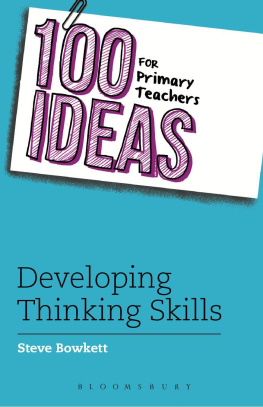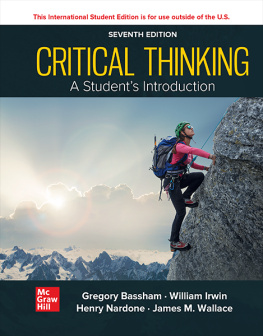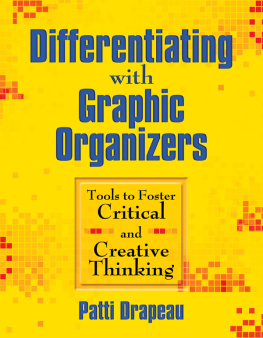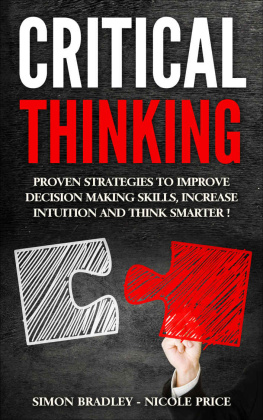
The Hungry Brain: The Nutrition/Cognitive Connection
Susan Augustine
inFormative Assessment: When Its Not About a Grade
Robin J. Fogarty and Gene M. Kerns
The Adult Learner: Some Things We Know
Robin J. Fogarty and Brian M. Pete
How to Differentiate Learning: Curriculum, Instruction, Assessment
Robin J. Fogarty and Brian M. Pete
A Look at Transfer: Seven Strategies That Work
Robin J. Fogarty and Brian M. Pete
Close the Achievement Gap: Simple Strategies That Work
Brian M. Pete and Robin J. Fogarty
Nine Best Practices That Make the Difference
Brian M. Pete and Robin J. Fogarty
Data! Dialogue! Decisions! The Data Difference
Brian M. Pete and Robin J. Fogarty
Cooperative Learning: A Standard for High Achievement
R. Bruce Williams
Higher-Order Thinking Skills: Challenging All Students to Achieve
R. Bruce Williams
Multiple Intelligences for Differentiated Learning
R. Bruce Williams

Copyright 2003 by R. Bruce Williams
First Skyhorse Publishing edition 2015
All rights reserved. No part of this book may be reproduced in any manner without the express written consent of the publisher, except in the case of brief excerpts in critical reviews or articles. All inquiries should be addressed to Skyhorse Publishing, 307 West 36th Street, 11th Floor, New York, NY 10018.
Skyhorse Publishing books may be purchased in bulk at special discounts for sales promotion, corporate gifts, fund-raising, or educational purposes. Special editions can also be created to specifications. For details, contact the Special Sales Department, Skyhorse Publishing, 307 West 36th Street, 11th Floor, New York, NY 10018 or info@skyhorsepublishing.com.
Skyhorse and Skyhorse Publishing are registered trademarks of Skyhorse Publishing, Inc., a Delaware corporation.
Visit our website at www.skyhorsepublishing.com.
10 9 8 7 6 5 4 3 2 1
Library of Congress Cataloging-in-Publication Data is available on file.
Print ISBN: 978-1-63220-556-8
Ebook ISBN: 978-1-63220-973-3
Printed in the United States of America
Dedication
To Jim Kelly who compassionately blends his heart with his profound thoughtfulness in order to bring life to those who he cares for.
Contents
INTRODUCTION
THE SITUATION NOW
As the stakes are raised in testing and accountability, recall of subject matter has become more and more important. However, both past and present voices are raising questions about using recall as the sole bottom line of schooling. Although recall is important, recall is not to be confused with depth knowledge, thought, and learning. As Paul said, To this day we have refused to face these facts about knowledge, thought, and learning. To this day we commonly teach as if mere recall were equivalent to knowledge (1993, p. viii).
There is no question that recall is crucial in this day of high-stakes testing. Furthermore, brain research is teaching educators about many ways to assist students in recalling information. However, recall alone is not enough for the person of the twenty-first century. Indeed, some standardized testing does reflect the demand for skills that go far beyond recall:
Recall alone is not enough for the person of the twenty-first century.
Yet classroom instruction around the world, at all levels, is typically didactic, one-dimensional, and indifferent, when not antithetical, to reason. Blank faces are taught barren conclusions in dreary drills. There is nothing sharp, nothing poignant, no exciting twist or turn of mind and thought, nothing fearless, nothing modest, no struggle, no conflict, no rational give-and-take, no intellectual excitement or discipline, no pulsation in the heart or mind. Students are not expected to ask for reasons to justify what they are told to believe. They do not question what they see, hear, or read, nor are they encouraged to do so.... They do not challenge the thinking of other students nor expect their thinking to be challenged by others. (Paul, 1993, p. ix)
Teachers cheat their students if all they ask of them is recall. By asking only for recall, teachers convey the message that the students own thinking is not valuable and that questioning and challenging ideas is not welcomethis makes for very boring class situations and creates minds that are dull and lazy. Talk about dumbing down the curriculum.
THE CASE FOR HIGHER-ORDER THINKING
As educators look ahead to future schools, much of the data and information they rely on today may be changed or repudiated. To prepare our young people for the possibilities and probabilities of the future that few of us can imagine, the wisest course seems to be a curriculum that triggers their critical and creative thinking (Bellanca & Fogarty, 1986, p. 5).
What can remain forever useful to the students of today is the capacity to think clearly and creatively in life and work situations. Prentice makes it clear: Teaching thinking is an essential foundation for developing the minds of tomorrows adults (Prentice, 1994, p. xi). In addition to requiring crucial data, information, concepts, processes, and tools, teachers are being called on to enable the thinking of every student. To prepare students for the world of rapid change, it is absolutely imperative that teachers groom their students to think critically and to think on their own. Consequently, the role of higher-order thinking, which has been encouraged by educators since the 1980s, has become more important than ever. Caine and Caine point this out:
Perhaps the most significant thing we have confirmed for ourselves is that, although actions are important, the thinking that influences and shapes what we do is far more critical. Changing our thinking is the first thing we have to do both individually and collectively, because without that change we cannot possibly change what we really do on a day-to-day basis. (1997, p. vi)
It is absolutely imperative that teachers groom their students to think critically and to think on their own.
The ability to think critically that comes with having the tools for higher-order thinking can help students far into their future not only grasp new information and material but also figure out how to change and adapt to new situations. Meir says, Feuerstein argues that enhancing a childs cognitive abilities can have a snowballing effect in that, with these abilities enhanced, the child is capable of learning additional and even more complex cognitive operations and strategies (Meir, 1994, p. 90). Feuerstein offers the possibility of ever-increasing higher order thinking capacities as more and more higher-order thinking occurs. Earlier, Paul suggested that higher-order thinking has a direct connection to the quality of life.
Elder and Paul strongly articulate that thinking is at the heart of our future, not only for our society but for every society in the world (1994, p. 34). They suggest three massive trends are gaining predominance: accelerating change, intensifying complexity, and increasing interdependence (p. 34). In their perspective, this makes it crystal clear that only minds that are adept at higher-order thinking skills can deal with the change, the complexity, and the interdependence that now are inextricably part of the world.

